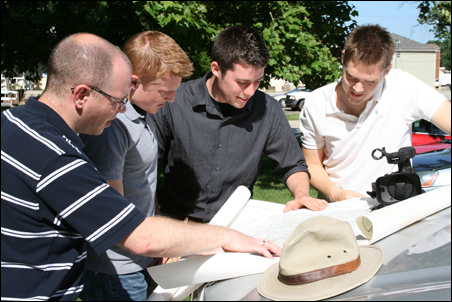EIU Filmmakers Document Oil Spill's Financial Impact on Gulf Coast
Jul-01-2010|
(From left) Eastern Illinois University faculty member Cameron Craig and EIU students Michael Gismondi, Zach Nugent and A.J. Schubert traveled to the Gulf of Mexico to document the "human element" of the BP oil spill's aftermath. |
When an Eastern Illinois University filmmaking team traveled to the Gulf Coast, they found that misconceptions about the oil spill's effects are adding to the woes of two of the hardest-hit towns in the form of decreased tourism.
Despite the fact that cleanup efforts were "quick and easy" in Grand Isle, La., and Dauphin Island, Ala., tourists were still avoiding the area when the team visited two weeks ago, said documentary-maker Cameron Craig, an EIU faculty member.
For example, a group of real estate agents said their answering machines were loaded with 52 messages from people canceling their rental reservations. Other businesses, such as restaurants, are affected in turn.
"It is an ecological disaster, and we know that is a major problem," Craig said. "But if we had not gone, then we would not have had that connection with those people, and we would not know what they are experiencing."
Craig was joined by three EIU students: Zach Nugent of Sheridan, a regional Emmy-winning reporter for WEIU-TV's "News Watch"; Michael Gismondi of Buffalo Grove, a WEIU-TV weather forecaster; and A.J. Schubert of Charleston, a graduate assistant in EIU's Center for Academic Technology Support.
"I really had the opportunity to see how it affects real people down there and how it's affecting their livelihood and they're struggling to stay afloat," Schubert said.
Residents of Dauphin Island, where they don't lock their doors at night, say they're "living in paradise," Schubert said. But some said the town has been turned into a "war zone," not because of the actual effects of the oil, but because of the influx of BP employees and media.
There are actually more BP employees in the area than actual residents, one woman said. Unfortunately for the tourism industry, the BP employees don't spend money the way tourists do. For example, she said, BP has its own catering service.
Bright spots could be found amid the tragedy. One fisherman's wife said that although her husband is unable to fish in the Gulf, he has found income by patrolling the waters for BP.
While Dauphin Island residents were pleasantly surprised by the minor amount of oil they experienced, they reiterated that "it was still a disaster for them," Craig said. The beaches there opened a day before the EIU team arrived.
A councilwoman got the EIU team past a checkpoint so they could assess the impact firsthand. There, they saw huge piles of sand put in place to soak up oil; once saturated, the sand was hauled off and used to make paving material.
The Civil Air Patrol provided a flight over the bay area, where the filmmakers observed oil in the water, as well as clean-up efforts.
The filmmakers also spoke with experts at Louisana State University's Earth Scan Laboratory about how hurricanes could potentially damage the coast further by pushing the storm surge several miles into the inland areas.
Many residents were hoping this would be a year of recovery after cleaning up from Hurricane Katrina, Nugent said. But the residents were not whining or expecting handouts, and the team found no sense of ill will toward those responsible for the oil spill, Nugent said.
"You really saw people coming together," Nugent said. "They don't hold any hate in their hearts. All they want is to get back to their normal lives."
"People seemed to be pleased with the cleanup process," Schubert said. "Everyone was volunteering to do whatever could be done to get things cleaned up."
Upon the EIU team's return to campus, WEIU-TV aired some of the 11 hours of footage from the trip. Next, the footage will be made into a narrative documentary film, "letting the interviews and images speak for themselves," Craig said.
The film, titled "Returning to Paradise: Voices of the Human Spirit," could be ready as early as this fall, Craig said. He's making plans for a return visit to film a follow-up, possibly over the winter break.
"Our observation is limited to two locations," Craig said. "We want to get other perspectives along the coast to bring these people's stories back here."
Craig is already using the footage in a class. When he showed one interview, it sparked several minutes of student-only discussion among the 25-member class.all about," Craig said.
From an educational standpoint, the project is a great way for the students on the filmmaking team to gain top-notch first-hand experience.
"We could very well work 40 more years and never get the opportunity to work on a story like this in our careers," Gismondi said.
"You physically cannot get this type of experience in a classroom," Nugent said.
Both students agreed that the experience was a great hands-on look at the dangers of sensationalism in the media and how to avoid it.
"From a journalistic standpoint, it taught me that you want to get the powerful story, but you also want to get the bigger picture," Nugent said.
"There's a way of presenting the story without taking sides, and just putting the viewers down there so they can make their own choices of how to feel about it," Gismondi said. "I think we've done a good job of capturing that."
The project was funded by $1,050 from EIU departments and private donors. All additional expenses were covered by Craig.
For details of the trip, a trailer of the documentary and links to the news reports aired on WEIU-TV's "News Watch," see www.tcpfilms.com.
